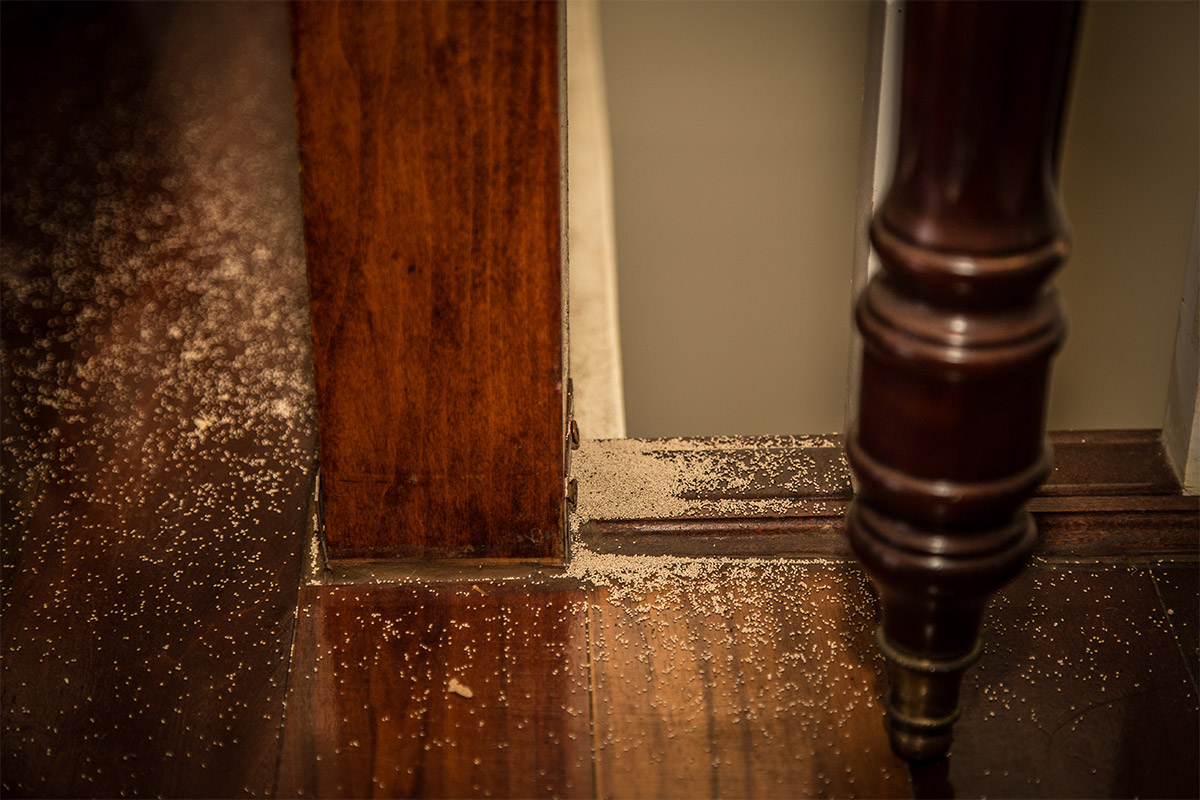Should you buy a home with Termite damage?

So, you think you found the home of your dreams, only to discover termite damage during the inspection? Oh, no. Should you go ahead with the purchase?
Consistent humidity and damp environments can lead to Termite infestations.
Buyer Beware
How to identify and treat termite damage before you buy your home. The seller wants to move into their new house that they're buying, they're going to pay money for another home, they're moving out of this home. So how much do they care really about what is happening in this home and do they want to put a lot of money into this home or do they want to take their money and put it in their new home? So buyer beware, that means you need to pay attention to what's happening with that home. So here's some things that you can look for. Keep an eye out for mud tubes, check door frames, window seals, eaves and rafter tails (exposed exterior portion of a building's wood structural truss). Touch, listen and feel for uneven, crinkly wood on the outside of the home, especially decks and porches. Entry points for Termites can come from cracks in your foundation and anywhere there is wood-to-ground contact.
If you see droppings like multi-coloured coffee grounds, if you see wings, these are evidence of Termites being around. Other things to look for would be water stains. You want to look at the roof and see if the roof is straight. These are all things tto make sure that you're not buying a money pit. So once you have done your own due diligence, along with hiring a professional to come and do an inspection, you want to know how bad is the damage?
According to QBCC, Termite infestations cause millions of dollars in damage each year to timber in homes across Australia. This is not covered on homeowners insurance either, especially if the termites are underground (subterranean termites), they can go undetected and do damage without you ever seeing any evidence.

How to identify when Termite damage is bad
So the question often asked of Termite Inspectors is "how to identify when damage is bad". Based on cost and time of the costs of rectification. So if you have something that is superficial, such as a facia board, something that can be easily replaced without much time or material then that would be relatively cheap. It may just need minor repairs and is not consider as being a real financial burden.
But if you have something that you see where the integrity of the wood has been compromised, where you're going to have to replace a huge beam, or the floor is water damaged or something and you step on it and it creaks (sagging floors) and it gives way then obviously that's going to be a higher cost.
Obviously you don't want to pay 1000s of dollars to repair a home that isn't even yours. You might be able to work it out with the seller to pay for the repairs. But now you have to go through the process of having your brand new home renovated.
When selling your home - preventing Termites
How about if you're getting ready or you're thinking about selling your home? How to prevent termites in the first place?
What are some of the preventative measures people can take obviously, you want to get a termite inspection regularly. QBCC recommend Termite Inspections every 12 months in termite zones and less if there has already been an outbreak in your home.
Termite Barriers can be chemical barriers and or physical barriers.
You want to take precautions and you want to make sure that if there is anything lurking there, you want to take care of it. The sooner you can catch a termite problem, the better, less expensive and less time to fix.
Often. The only way to know you have termites is by having an inspection. So calling a professional is a good first step during the purchasing process. The good news is that once a licensed termite control company comes in and eliminates the termites the process of making the home whole again can begin.
SEARCH ARTICLES
Recent Posts
- Jul, 22, 2025
- May, 6, 2025
Diversity on Boards
- Apr, 11, 2025
When does asbestos become dangerous in your home?
- Jan, 23, 2025
How Design Aesthetics Shape Perceived Value
- Dec, 10, 2024
Impact of Inflation on First-Time Buyers
- Nov, 4, 2024
How to understand and check your credit score
- Sep, 19, 2024
Buying off the plan? Beware of sunset clauses
- Jul, 5, 2024
Essential Workers Explained
- Jun, 13, 2024
Ozone Generators to remove Mould
- Feb, 19, 2024
Massive tax handouts for property investors
- Feb, 16, 2024
Body Corporate sinking fund - QLD
- Feb, 2, 2024
Scaffolding Safety
- Sep, 20, 2023
Learning to Negotiate
- Jul, 11, 2023
Pension Age Rises to 67
- May, 18, 2023
Becoming A Registered Builder In Australia
- Apr, 17, 2023
Forced Sales - Queensland - 75% Rule
- Dec, 6, 2022
Petty Landlords & Negative Gearing
- Sep, 19, 2022
The benefits of shade sails for your home
- Jul, 27, 2022
Termite Swarmers Season
- Jun, 22, 2022
Fear of missing out driving inflation
- Apr, 28, 2022
Australia's Rental Crisis
- Mar, 3, 2022
Tactics to reduce body corporate disputes
- Jan, 25, 2022
Globalisation - The Hedgehog & The Fox
- Nov, 2, 2021
Revealed: Top 10 areas to avoid buying
- Oct, 28, 2021
Is that house protected against termites?
- Sep, 15, 2021
Tree Changers & Sea Changers
- Aug, 12, 2021
COVID 19 and Body Corporate Responsibilities
- Jul, 29, 2021
Tenants beware of rental rewards schemes
- Jun, 25, 2021
Sunshine Coast versus Gold Coast
- Jun, 23, 2021
Your superannuation and your home
- Jun, 11, 2021
How many properties sit empty?
- May, 10, 2021
What Returns could I make from Property Investment
- May, 4, 2021
Real Estate Agents and Property Managers
- Apr, 20, 2021
Why You Need A Termite Inspection
- Mar, 19, 2021
SEO for Real Estate websites
- Mar, 18, 2021
Three Reasons Why Your Home Needs Data Cabling
- Mar, 16, 2021
Smoke Alarms: What you need To know in QLD
- Dec, 10, 2020
Pre-purchase Electrical Inspection
- Dec, 4, 2020
Why should I drink Adelaide Hills Wines?
- Aug, 26, 2020
Amalgamation of Strata-titled Lots for Development
- Jul, 28, 2020
Adelaide Hills a unique region
- Apr, 28, 2020
Ozone Generator in Your Home
- Apr, 21, 2020
Air conditioning cleaning
- Apr, 14, 2020
Housing Affordability in Australia
- Apr, 6, 2020
Security Systems
- Mar, 31, 2020
Termites and protecting the home
- Feb, 27, 2020
Printing for the Real Estate Industry
- Nov, 12, 2019
Beware of Property Investment Spruikers
- Oct, 31, 2019
Prices for Home Alarm Monitoring
- Oct, 9, 2019
House and Land packages best investment
- Oct, 1, 2019
The 'Scourge' of Underquoting
- Oct, 16, 2017
Professional Pest Control
- Sep, 29, 2017
Built in Wardrobes
- Jul, 9, 2015
Pool Inspections Queensland
- Jun, 25, 2015
Negotiating your purchase with the Inspection
- May, 12, 2015
DIY Move or hire a removalist company?
- Nov, 19, 2014
Why are housing prices rising faster than wages?
- Jan, 17, 2014
The Friendliest Real Estate Agents
- Jul, 23, 2013
A thorough Building and Pest Inspection
- Sep, 28, 2012
How to Compare Home Loans
- Jan, 25, 2012
Southport Real Estate

